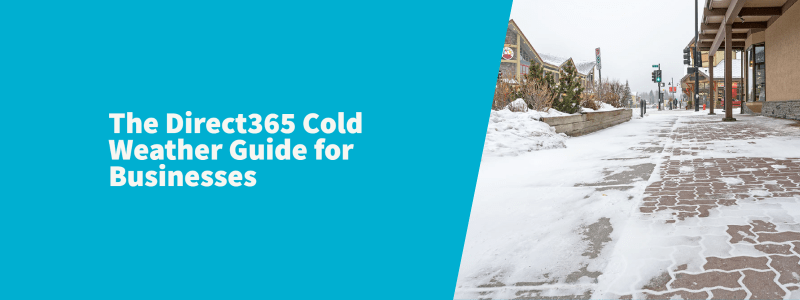There’s no time like the present to think about the upcoming winter and all the problems the season may throw up. The cold weather can bring organisations to a standstill. So, what should you be doing in order to keep things running as smoothly? As the small business experts, Direct365 know exactly how small businesses work and even more so how external factors impact how they make money. So, sit back and relax as we talk you through how to weatherproof your business this coming winter, from gritting salt to PPE.
What the Law Says About Cold Weather and Business
There’s no law about trading in the winter. Like any other season, most days are safe and sound. But you’ll still want to ensure the business you run is safe to operate. If a customer or employee slips, for example, there could be a chance they would be entitled to sue, especially if the cause was due to something that you could have avoided. While those likelihoods are slim, they are still things you need to consider.
One thing the government does state is that your workplace must be safe for employers to work in, and that includes temperature. Something that isn’t stated is a specific level of temperature that constitutes safe. We would suggest that a level of heating is available to keep employees and visitors warm and safe during the winter.
One thing to say is that there’s nothing advised by the government that says you are obliged to trade or stop trading during cold or extreme weather conditions. This is at your discretion, but you reputation could take a hit if your business is considered dangerous by local customers and employees.
How Cold Weather Impacts Businesses
The low temperatures can impact businesses in a number of ways. It all depends, first of all, on what your business does. There are some more robust industries – think insurance, for example – that can weather the storm, however most businesses rely on either products, delivery or physical sales to earn money. Which means that if you’re a small business owner, you need to be understanding how a cold snap could impact your business. It’s more than just spreading gritting salt and relaxing. Here are a few ways you could be impacted:
- Heating problems associated with colder weather
- Slips, trips and falls owing to ice or wet
- Vehicle problems due to cold
- Trouble making deliveries
- Struggle for customers getting to your premises
- Road closures and inability to travel
Any one of these ways could impact the way you do business and could seriously affect your bottom line. You will need to use a different way or means of reducing the level of risk with each of these points.
How Can You Combat Cold Weather Failures?
Cold weather offers up a few problems than need forward planning to solve. The likes of snowy roads and icy conditions are problems that are easily solved. But there are some things that you can’t necessarily plan for.
Busted Water Pipes
This is a killer for small businesses, especially those that rely on customers physically coming into your physical business.
Slips and Trips in the Ice and Snow
The one sure-fire way to help reduce the risk of visitors falling on ice is to lay gritting salt on the walkways and car parks around your business. This grit will thaw the ice and snow and leave your business easier to get to. There’s a couple of ways you can do this. The first is to buy the salt yourself. This is fairly inexpensive but means that you need to get to your property early enough to lay the grit.
The second option is to hire a company that do this for you. Direct365 offer a service that is based on the forecast temperature for each day. The customer sets the temperature they want the gritters to come, and when the weather forecast reaches that our service provider will come and grit your property. It’s simple but effective.
Vehicle Problems
Many temperature-related vehicle problems happen when they’re older. So the best thing you can do is ensure that your company cars or delivery vans are kept well serviced and if possible, frequently changed. This way they’re in the best shape to fend of any cold snap.
Trouble Making Deliveries
This is a difficult problem, whether that be larger scale stock deliveries to customers or making deliveries to consumers. Local councils should use gritting salt on roads, but it isn’t always that simple. Snow and ice make these types of things really difficult. But it’s very rare that the roads are too bad to travel. The best thing a company can do is to communicate early that their deliveries may be delayed. Customers often react well to proactive communication even if the news isn’t what they hoped.
Struggle for Customers Getting to Your Premises/Road Closures
There is very little option for this problem. If the roads are so bad, there’ll be no option for customers. While, as suggested earlier, you can hire the likes of Direct365 to grit your business property, if elsewhere is too slippery, all you can do is wait out the weather.
From Gritting Salt to PPE: Services to Protect Your Business from the Cold
Here are a few options for you to help protect your business from the cold:
- Direct365’s gritting service
- Tyre grips
- Cold weather PPE
- First aid kits
- Spill kits and absorbent material
- Silicone pipe heaters
Direct365 are the small business specialists. Understanding how businesses work is how we operate. Providing business-essential services and products is what we do best. For more information on our safety services, fill out the form below. Our friendly, knowledgeable team will get back to you to tell you a bit more about how we can save you money and hassle on your essential services.


